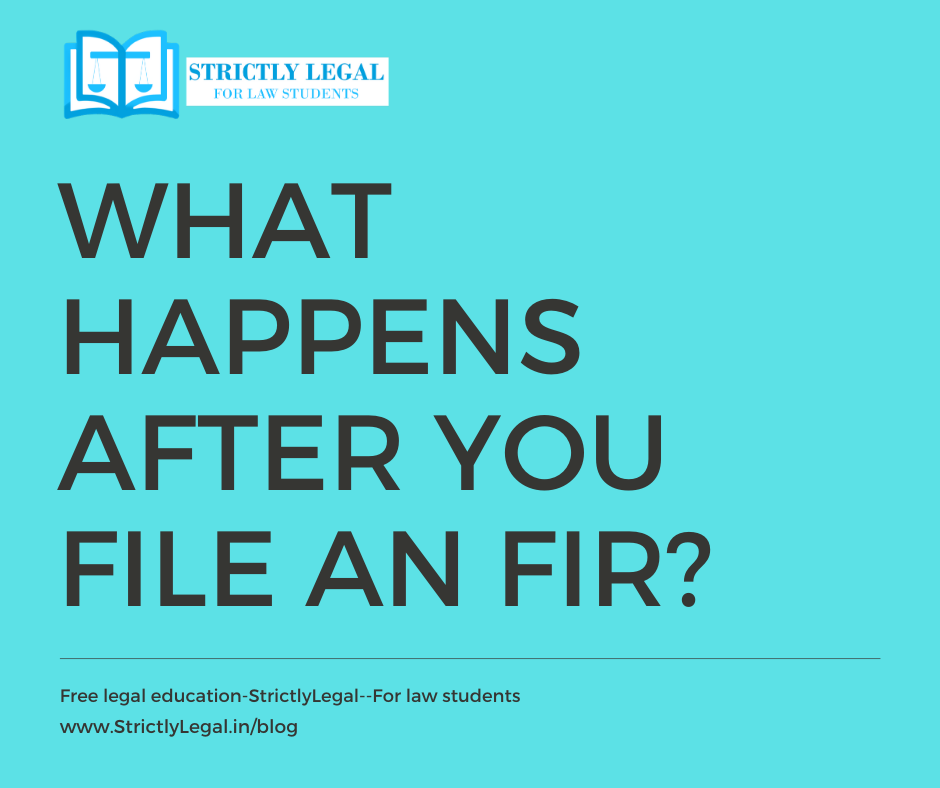In this article, we will discuss the aftermath of filing or registering a First Information Report (FIR). We are often faced with curiosity and questions like What Happens After an FIR is filed? or What does the police do after FIR?
Also, Here’s a link to How to Write a First Information Report (FIR), check it out for more information and tips on writing an FIR.
Table of Contents
The Journey after FIR is filed
Preliminary Investigation
In circumstances like Murder, housebreaking, and other cognizable offenses the police van will make a visit to the PLACE OF OCCURENCE and take an on-ground analysis of the actual circumstances.
Here, the visiting police officers may talk to the witnesses, neighbours, collect evidence, record statements, and even make arrests. Depending on the facts of each case.
Prepare a report
After the preliminary investigation is over, the police will have to present a report to the magistrate concerned about the case.
Here, the reports may be of two kinds:
1. Closure report
2. Charge Sheet or final Report
A closure report refers that no evidence was found against the accused and the police have no reason why the trial should be conducted.
On the other hand, A charge sheet is a detailed report of the offences allegedly committed and the evidence found therein. It may contain all the panchnamas, list of witnesses, details of charges slapped and etc.
Submission of Investigation Report
If the alleged offense is punishable with imprisonment of 10 years or above, the charge sheet must be filed within 90 days of registration of the FIR otherwise within 60 days.
Magistrate Decides
After receiving the Final Report from the police the magistrate decides further actions.
If a closure report is received, the magistrate may trust the report and close the case or he may direct re-investigation or he may take up cognizance of the case and summon the accused directly.
A closure report may also be challenged by the Informant or the Complainant who has filed such FIR. [Bhagwat Singh vs Commissioner Of Police]
In the case of Chargesheet, the magistrate will take cognizance of the case and proceed with the trial of the case.
If the offence is such that it requires to be tried by a session judge, then the documents shall be forwarded to the district or sessions court for further proceedings.
Otherwise, it is tried in the same court.
Getting the LAWYERS INVOLVED
Lawyers can get involved from any stage though but in general, circumstances, once the trial starts the lawyers are either appointed by the party involved or by the state if the party cannot afford private representation.
Opening of the CASE
Section 226, CrPC states that the public prosecutor opens the case and introduces the facts and explains the charges slapped against the accused with supporting evidence to the charges.
Discharge
Under Section 227 CrPc, if the judge finds that the charges slapped have no reasonable ground to stand, the charges are discharged and the reasons of doing so are recorded.
Framing of Charges
Section 228 CrPc states, If the judge is of the opinion that charges may exist that are not triable by that court, he may level such charges and by order transfer the case to the appropriate court.
OR If the court finds a charge, it may suo-moto frame such charge and explain to the accused about the charge framed and if he/she pleads guilty of such a charge.
Conviction of Plea of guilty
Under Section 229 CrPcIf the accused person accepts the charges leveled against him and he pleads guilty, the judge convicts him and delivers judgment.
Final Judgement
After following the due procedure and keeping in view of the Principles of Natural Justice, a final judgment is delivered.
Section 235 – Judgment of acquittal or conviction
Extra Reading
There’s this very IMPORTANT CASE that every Law Student MUST READ. The Supreme court judgment reads and explains the procedure after Filing an FIR very clearly.
When the report forwarded by the Officer-in-charge of a police station to the Magistrate under sub section (2) (i) of section 173 comes up for consideration by the Magistrate, one of two different situations may arise.
The report may conclude that an offence appears to have been committed by a particular person or persons and in such a case, the Magistrate may do one of three things:
(1) he may accept the report and take cognizance of the offence and issue process or
(2) he may disagree with the report and drop the proceeding or
(3) he may direct further investigation under sub-section
(3) of section 156 and require the police to make a further report.The report may on the other hand state that, in the opinion of the police, no offence appears to have been committed and where such a report has been made, the Magistrate again has an option to adopt one of three courses:
(1) he may accept the report and drop the proceeding or
(2) he may disagree with the report and taking the view that there is sufficient ground for proceeding further, take cognizance of the offence and issue process or
(3) he may direct further investigation to be
made by the police under sub-section (3) of section 156.Where, in either of these two situations, the Magistrate decides to take cognizance of the offence and to issue process, the informant is not prejudicially affected nor is the injured or in case of death, any relative of the deceased aggrieved,because cognizance of the offence is taken by the Magistrate and it is decided by the Magistrate that the case shall proceed.
But if the Magistrate decides that there is no sufficient ground for proceeding further and drops the proceedings or takes the view that though there is sufficient ground for proceeding against others mentioned in the First Information Report, the informant would certainly be prejudiced because the First Information Report lodged by him would have failed of its purpose; wholly or in part. Moreover, when the interest of the informant in prompt and effective action being taken on the First Information Report lodged by him is clearly recognised by the provisions contained in sub-section (2) of section 154, subsection (2) of section 157 and sub-section (2) (ii) of section 173, it must be presumed that the informant would equally be interested in seeing that the Magistrate takes cognizance of the offence and issues process, because that would be culmination of the First Information Report lodged by him.
The Court is accordingly of the view that in a case where the Magistrate to whom a report is forwarded under subsection (2) (i) of section 173 decides not to take cognizance of the offence and to drop the proceedings or takes the view that there is no sufficient ground for proceeding against some of the persons mentioned in the First Information Report, the Magistrate must give notice to the informant and provide him an opportunity of being heard at the time of consideration of the report, and the difficulty of service of notice on the informant cannot possibly provide any justification for depriving the informant of the opportunity of being heard at the time when the report is considered by the Magistrate.
Bhagwat Singh vs Commissioner Of Police
New Law update: Section 156(3) of the CrPC has been replaced by Section 175(3) in the new Bharatiya Nagarik Suraksha Sanhita (BNSS), 2023
What Section 156(3) CrPC was:
Section 156(3) CrPC empowered magistrates to order police investigation into cognizable offences when police authorities declined to register an FIR Drishti Judiciary.
Key Changes in Section 175(3) BNSS:
The new provision introduces several important procedural safeguards:
1. Affidavit Requirement: The magistrate must consider an application supported by an affidavit made by the complainant to the effect that he had indeed communicated the non registration of FIR to the Superintendent of Police.
2. Mandatory Inquiry: The magistrate must make an inquiry on the complaint and consider submissions made by the police officer regarding the complaint before ordering investigation
3. Prior Recourse Required: The complainant is mandatorily required to first pursue resolution with the Superintendent of Police before seeking the magistrate’s intervention
4. Special Protection for Public Servants: For complaints against public servants arising in the course of official duties, investigation can be ordered only after receiving a report from the superior officer and considering the public servant’s assertions about the incident.
These changes aim to prevent frivolous complaints and ensure judicial application of mind before directing police investigations, while maintaining citizens’ access to justice when police refuse to register FIRs.
Understanding the New Rules for Filing Police Complaints
The Old Way (Under CrPC) Here’s how it used to work. If someone filed a private complaint, a magistrate could tell the police to investigate it. Simple as that. The magistrate had the power to make sure complaints didn’t just get ignored. What Changed (Under the New BNSS Law) The basic idea stays the same. But now there are extra steps. Think of it like adding safety checks before a big decision gets made. New Requirements for Regular Complaints Before a magistrate can order the police to investigate, they must now: First, look into the complaint themselves. Not just rubber-stamp it. Second, hear what the police have to say about it. Get their side of the story. The complainant also needs to provide a sworn statement. That’s called an affidavit. This means magistrates can’t just automatically send every complaint to the police anymore. They have to actually examine it first. Special Rules for Complaints Against Government Officials Here’s something completely new.
The old law didn’t have any special process for complaints against government workers like police officers or clerks. The new law does. Now, if someone wants to complain about a government employee’s official actions, two extra things must happen: One – The magistrate must get a report from that employee’s boss. What happened? What are the facts? Two – The government employee gets to explain their side. What was the situation? Why did they act that way? Only after these two conditions are met can an investigation be ordered. Why These Changes Matter The government made these changes to prevent misuse. Anyone could file a complaint before. Some were genuine. Others were just harassment. Now there’s more accountability. More careful checking.
The goal? Balance justice for victims with protection against false accusations. Especially for government workers who might face complaints just for doing their jobs.

Passionate about using the law to make a difference in people’s lives. An Advocate by profession.




